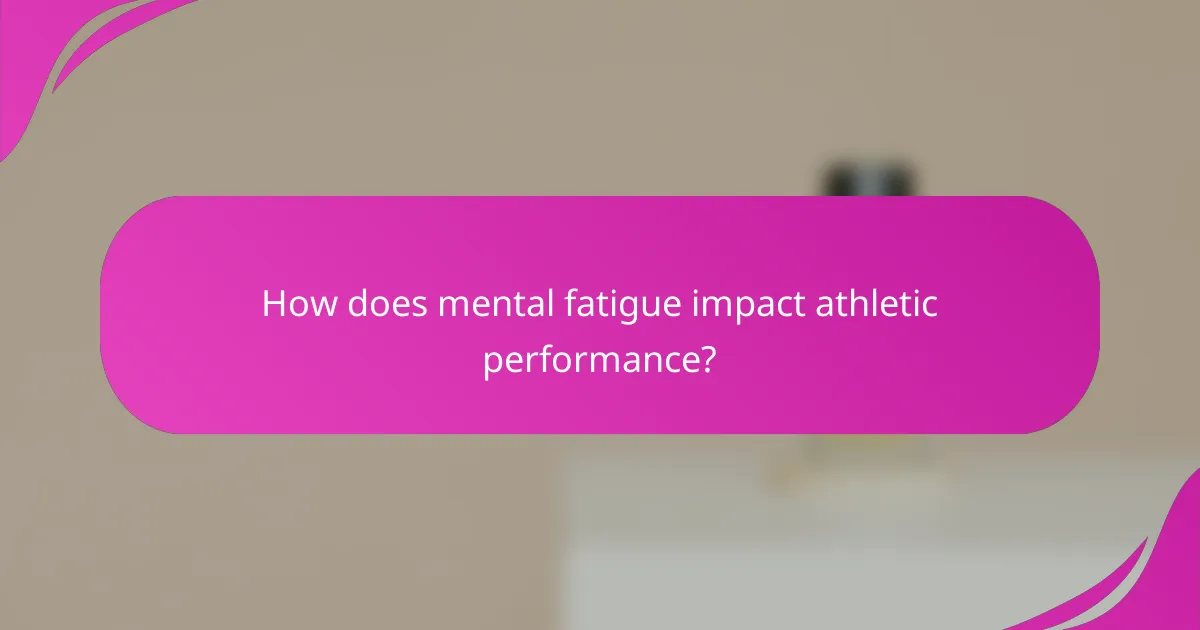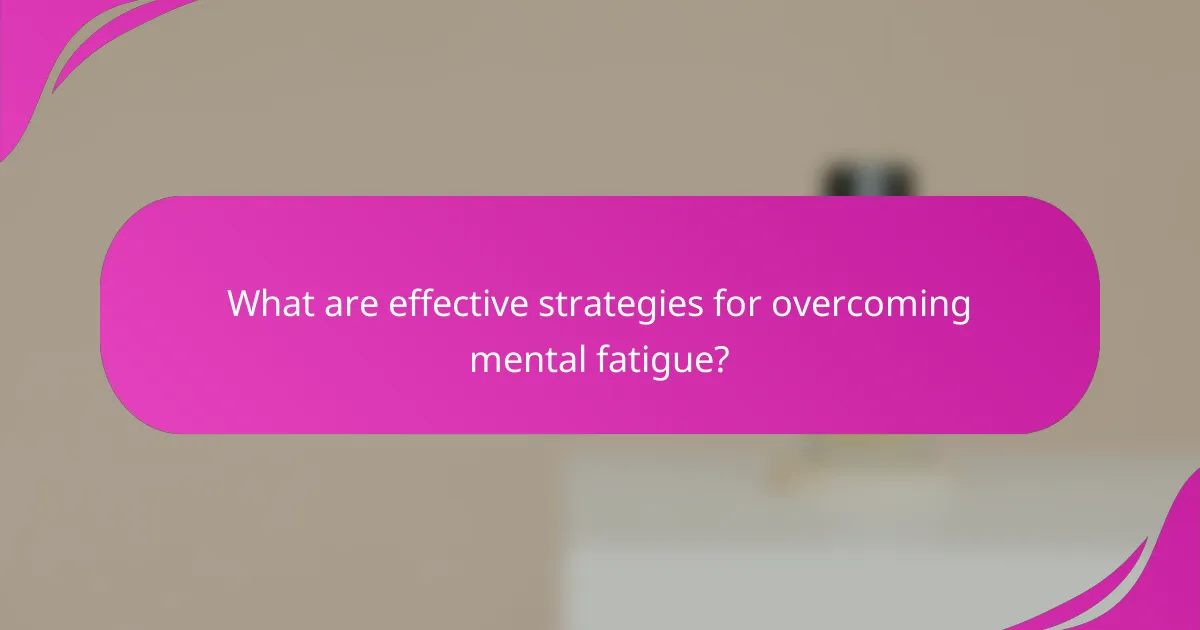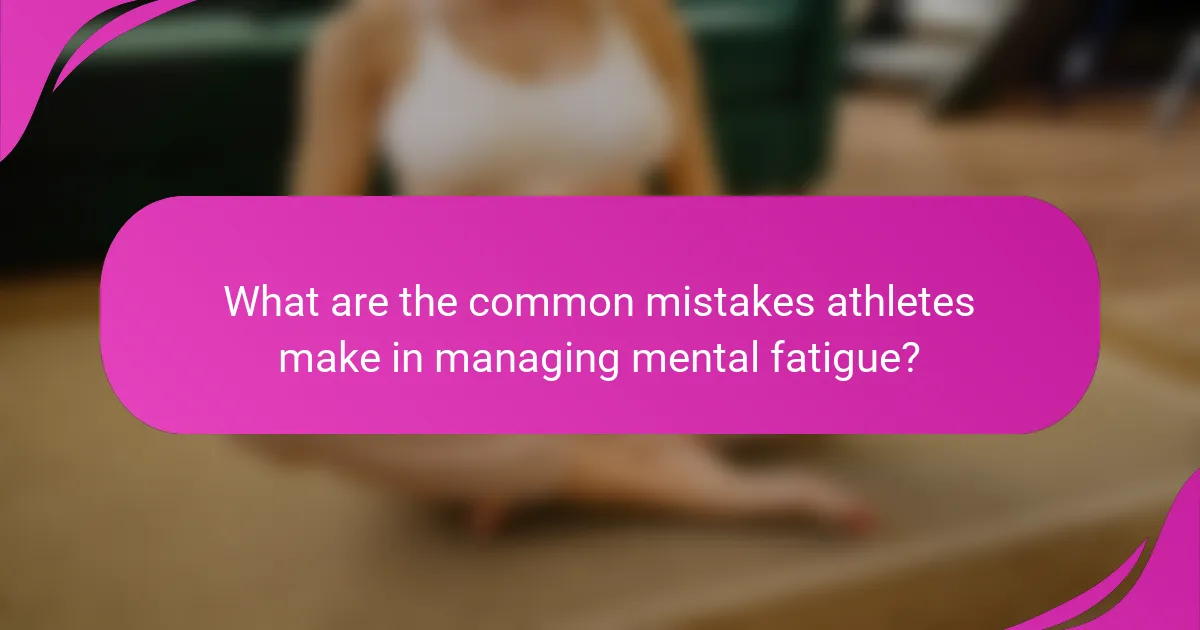Mental fatigue can severely impact athletic performance, diminishing focus and resilience. This article explores strategies to combat mental fatigue, including structured rest and mindfulness practices. It also highlights the importance of recognizing rare factors that contribute to fatigue and offers best practices for enhancing mental clarity and motivation. By implementing these techniques, athletes can improve their performance and achieve greater mental strength in competition.

How Does Mental Fatigue Impact Athletic Performance?
Mental fatigue significantly hinders athletic performance by reducing focus, reaction times, and overall resilience. Athletes facing mental fatigue may experience decreased motivation and impaired decision-making, which can lead to suboptimal performance. Research indicates that mental fatigue can lower endurance and increase perceived exertion, making physical tasks feel more challenging. Strategies to combat mental fatigue include structured rest, mindfulness practices, and cognitive training, which enhance focus and resilience during competition. Implementing these strategies can lead to improved athletic outcomes and greater mental clarity.
What are the signs and symptoms of mental fatigue in athletes?
Mental fatigue in athletes manifests through decreased motivation, impaired concentration, and increased irritability. Other signs include reduced performance, difficulty in decision-making, and physical symptoms like headaches or sleep disturbances. Recognizing these symptoms is crucial for implementing effective strategies to combat mental fatigue and enhance overall performance.
What is the relationship between mental fatigue and focus?
Mental fatigue significantly impairs focus, reducing cognitive performance and decision-making abilities. This relationship highlights the need for effective recovery strategies in sports. Techniques such as adequate rest, hydration, and mental breaks can restore focus and enhance performance. Research shows that athletes who manage mental fatigue exhibit greater resilience and improved concentration during competitions. Prioritizing mental recovery is crucial for sustaining high performance levels.
How does mental fatigue affect resilience in sports?
Mental fatigue significantly reduces resilience in sports by impairing focus and decision-making. Athletes experiencing mental fatigue often struggle to maintain motivation and cope with stress during competitions. Research shows that mental fatigue can lead to decreased performance levels, as cognitive resources become depleted. Strategies to combat mental fatigue include regular mental breaks, mindfulness practices, and structured training that incorporates rest periods. These methods help enhance focus and improve overall resilience, allowing athletes to perform at their best despite mental challenges.

What Are Effective Strategies for Overcoming Mental Fatigue?
To overcome mental fatigue in sports, implement strategies that enhance focus, resilience, and performance. Prioritize adequate rest and recovery, as sleep quality directly impacts cognitive function. Incorporate mindfulness and meditation practices to improve concentration and reduce stress. Utilize structured training schedules that balance intensity with recovery periods, fostering sustained mental engagement. Finally, set specific, achievable goals to maintain motivation and clarity during training and competition.
Which cognitive techniques can enhance focus?
Cognitive techniques that enhance focus include mindfulness practices, visualization, and structured goal-setting. Mindfulness reduces distractions and improves concentration by promoting present-moment awareness. Visualization enhances performance by mentally rehearsing successful outcomes, which can boost confidence. Structured goal-setting, such as SMART goals, provides clear targets, helping athletes maintain focus and motivation.
How can visualization techniques improve performance?
Visualization techniques can significantly enhance performance by improving focus and reducing mental fatigue. These methods help athletes mentally rehearse their actions, leading to better execution during competition. By creating vivid mental images, athletes can boost confidence and resilience, ultimately improving their overall performance. Research indicates that consistent visualization practice can result in a measurable increase in performance metrics, such as reaction time and accuracy.
What role does goal-setting play in mental recovery?
Goal-setting plays a crucial role in mental recovery by providing structure and motivation. It enhances focus, promotes resilience, and helps athletes manage mental fatigue effectively. Setting specific, measurable, achievable, relevant, and time-bound (SMART) goals can lead to improved performance and mental clarity. Research indicates that athletes who engage in goal-setting experience reduced anxiety and increased confidence, facilitating a more effective recovery process.
What physical strategies can aid in mental recovery?
Physical strategies that enhance mental recovery include structured exercise, proper nutrition, adequate hydration, and restorative sleep. Engaging in regular physical activity can boost endorphin levels, which improves mood and reduces fatigue. Consuming a balanced diet rich in vitamins and minerals supports cognitive function and energy levels. Staying hydrated is crucial for optimal brain performance, as even mild dehydration can impact focus. Finally, prioritizing restorative sleep allows the brain to recover and consolidate memories, further enhancing mental resilience.
How does proper nutrition influence mental clarity?
Proper nutrition significantly enhances mental clarity by providing essential nutrients that support brain function. A balanced diet rich in omega-3 fatty acids, antioxidants, and vitamins can reduce mental fatigue and improve focus. For instance, foods like fatty fish, berries, and leafy greens contribute to cognitive resilience. As a result, athletes can experience improved performance and decision-making during competition.
What are the benefits of adequate sleep for athletes?
Adequate sleep significantly enhances athletic performance by improving focus, resilience, and recovery. Quality sleep boosts cognitive function, allowing athletes to make better decisions during competition. It also aids in muscle repair and growth, essential for physical performance. Studies show that sleep-deprived athletes experience reduced reaction times and increased fatigue, negatively impacting their overall performance. Prioritizing sleep can lead to a unique competitive advantage in sports.
How can mindfulness practices reduce mental fatigue?
Mindfulness practices can significantly reduce mental fatigue by enhancing focus and promoting relaxation. Techniques such as meditation and deep-breathing exercises help athletes regain mental clarity. Research indicates that consistent mindfulness training improves cognitive function, allowing for better decision-making during high-pressure situations. As a result, athletes experience increased resilience and performance.

What Unique Approaches Can Athletes Use for Mental Recovery?
Athletes can utilize unique approaches for mental recovery by incorporating mindfulness techniques, visualization practices, and structured downtime. Mindfulness enhances present-moment awareness, reducing anxiety and improving focus. Visualization allows athletes to mentally rehearse performances, fostering confidence and reducing mental fatigue. Structured downtime, including rest days and leisure activities, promotes recovery and resilience, essential for sustained performance.
How can sports psychology techniques enhance mental resilience?
Sports psychology techniques enhance mental resilience by fostering focus, confidence, and stress management. Techniques such as visualization, self-talk, and mindfulness improve athletes’ ability to cope with pressure. For example, visualization helps athletes mentally rehearse performance, reducing anxiety and enhancing concentration. As a result, these strategies lead to improved performance under stress. Research indicates that athletes who regularly employ these techniques experience greater mental toughness and resilience, crucial for overcoming mental fatigue in competitive sports.
What role do team dynamics play in mental recovery?
Team dynamics significantly enhance mental recovery by fostering support, communication, and collaboration among athletes. Positive interactions within a team can alleviate stress and promote resilience. Research indicates that cohesive teams experience lower levels of mental fatigue, leading to improved focus and performance. Furthermore, shared goals and mutual encouragement create an environment conducive to recovery. In essence, strong team dynamics serve as a unique attribute that facilitates mental recuperation, ultimately enhancing overall athletic performance.

What Rare Factors Contribute to Mental Fatigue in Sports?
Rare factors contributing to mental fatigue in sports include inadequate recovery time, lack of variety in training, and psychological pressure from performance expectations. These aspects can lead to diminished focus and resilience. For instance, overtraining without sufficient rest can cause burnout, while monotony in practice routines may hinder motivation. Additionally, external pressures from coaches or fans can create mental strain, affecting overall performance. Addressing these rare factors is essential for athletes seeking to overcome mental fatigue.
How do personal life stressors impact athletic performance?
Personal life stressors significantly hinder athletic performance by causing mental fatigue, reducing focus, and impairing resilience. Stress can lead to decreased motivation and increased anxiety, which negatively affects training and competition outcomes. Athletes experiencing high stress often struggle with concentration, decision-making, and overall performance consistency. Implementing effective stress management strategies, such as mindfulness and cognitive behavioral techniques, can enhance mental resilience and improve athletic performance.
What uncommon practices can help combat mental fatigue?
Engaging in mindfulness practices can significantly reduce mental fatigue in sports. Techniques like meditation and focused breathing enhance concentration and promote resilience. Additionally, incorporating nature exposure, such as outdoor training, can rejuvenate the mind and improve overall performance. Experimenting with creative visualization helps athletes mentally rehearse scenarios, boosting confidence and focus. Engaging in diverse physical activities, like yoga or dance, can also stimulate mental engagement and combat fatigue.

What Are the Common Mistakes Athletes Make in Managing Mental Fatigue?
Athletes often make critical mistakes in managing mental fatigue, which can negatively impact performance. Common errors include neglecting rest, failing to recognize fatigue signs, and not using mental recovery techniques. Many athletes underestimate the importance of mental breaks, leading to burnout. Additionally, a lack of communication with coaches about mental state can hinder effective support. Lastly, some athletes may rely solely on physical training, ignoring the mental aspects essential for peak performance.
What misconceptions exist about mental fatigue and recovery?
Many misconceptions about mental fatigue suggest it is solely caused by lack of sleep or physical exertion. In reality, mental fatigue can stem from prolonged cognitive demands, emotional stress, and environmental factors. Recovery from mental fatigue is often misunderstood as simply resting, while effective strategies include structured breaks, mindfulness practices, and cognitive training. A unique attribute to consider is that mental fatigue can significantly impact decision-making and performance in sports, necessitating targeted recovery techniques.
How can athletes effectively track their mental health?
Athletes can effectively track their mental health by implementing regular self-assessments and utilizing mental health apps. Self-assessments help identify stress levels and emotional states, while apps provide tools for mood tracking and mindfulness exercises. Regular check-ins can enhance focus and resilience, crucial for performance.

What Best Practices Can Athletes Implement for Lasting Focus and Resilience?
Athletes can implement several best practices to enhance focus and resilience. Mindfulness techniques improve concentration and reduce anxiety. Establishing a routine fosters consistency, helping athletes stay mentally prepared. Goal setting provides direction and motivation, while positive self-talk reinforces confidence. Regular physical conditioning enhances mental stamina, mitigating fatigue during competitions.
How can regular mental health check-ins improve performance?
Regular mental health check-ins significantly enhance performance by reducing mental fatigue and improving focus. Consistent evaluations help athletes identify stressors and develop coping strategies. This proactive approach fosters resilience, enabling athletes to maintain optimal performance under pressure. Studies show that athletes who engage in regular mental health assessments experience improved concentration and decision-making skills, leading to better outcomes in competition.
What daily routines can support mental recovery?
Establishing daily routines can significantly enhance mental recovery in sports. Prioritize consistent sleep, balanced nutrition, and mindfulness practices to support focus and resilience.
Incorporate regular physical activity, even light exercises, to stimulate endorphin release and improve mood. Schedule time for relaxation techniques, such as meditation or deep breathing, to reduce stress levels.
Maintaining social connections with teammates or coaches fosters a supportive environment, promoting emotional well-being. Finally, set realistic goals and reflect on achievements to build a positive mindset.
How can athletes create a supportive environment for mental well-being?
Athletes can create a supportive environment for mental well-being by fostering open communication, promoting teamwork, and encouraging a culture of empathy. Open discussions about mental health reduce stigma and enhance connection among teammates. Team-building activities strengthen bonds, allowing athletes to share experiences and support each other. Additionally, incorporating mental health resources, such as workshops or counseling services, empowers athletes to prioritize their mental well-being. These strategies enhance resilience and focus, ultimately improving performance.